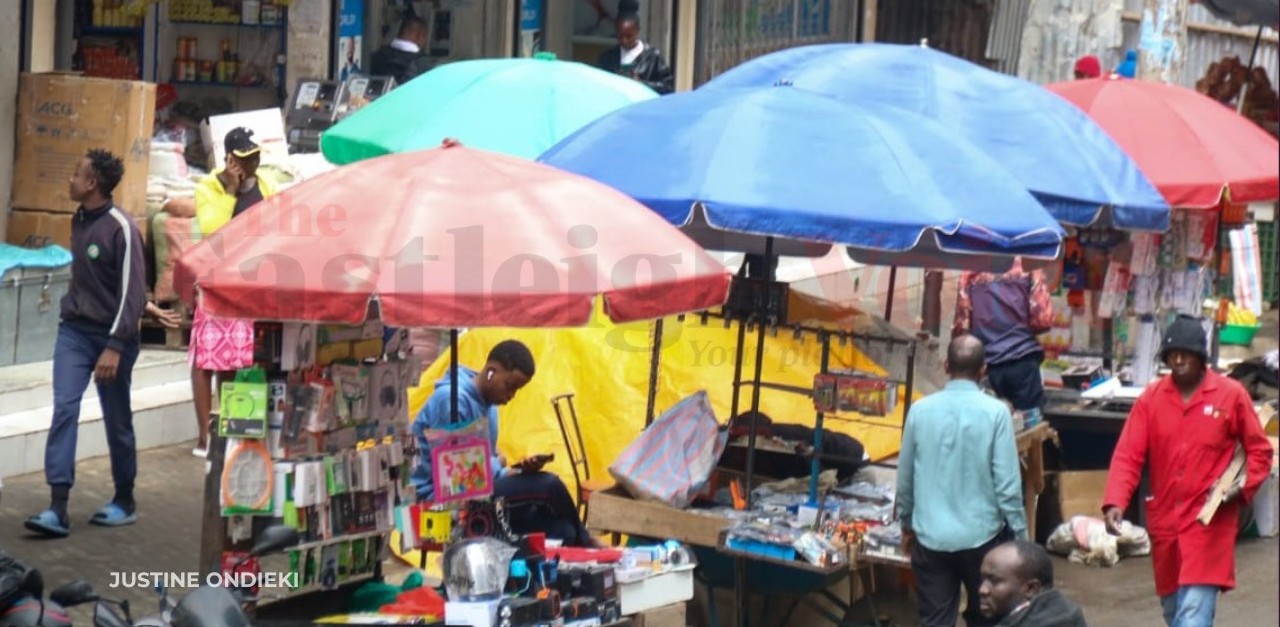Eastleigh traders urge City Hall to address street vendor clashes, poor roads, waste crisis

Street interviews conducted along Third to Seventh streets revealed growing frustration and a sense of helplessness among traders.
Small and medium-sized business owners in Eastleigh, Nairobi, are urging the county government to urgently tackle persistent issues—ranging from poor infrastructure to unregulated street vending—that they say are crippling their operations and threatening their livelihoods.
Street interviews conducted along Third to Seventh streets revealed growing frustration and a sense of helplessness among traders.
More To Read
- Somalia Independence Day celebrations banned in Eastleigh over security fears
- Silent struggles: Kenyan men speak out on financial pressure, mental health, and masculinity
- 13 suspects arraigned over mugging in Eastleigh's Maries Stopes area
- Hawkers celebrate fresh opportunities in Eastleigh’s Five Street
- Why Eastleigh is Nairobi’s economic powerhouse: Stories of hustle, culture and community
- Construction of Keroe Street begins, sparking hope for safer, accessible roads in California, Eastleigh
This is especially on matters of infrastructure and the tense coexistence between businesses of different sizes.
One of the most common concerns raised by many medium-sized enterprises is the disruption caused by the influx of roadside vendors, who set up tents and stalls right outside their premises, particularly near malls and high-rise buildings.
This issue was especially common among traders with ground-floor businesses, including those dealing in electronics, fashion, and household goods.
Obstruction
According to the traders, the obstructions are blocking visibility and access to their premises, which in turn hinders foot traffic and negatively affects their sales.
“We have invested heavily in our businesses and locations. It’s unfair that our storefronts are covered by makeshift stalls,” lamented Anthony, a phone repair and accessories shop owner along Seventh Street.
He also noted that attempts to engage their informal counterparts in dialogue and reach co-existence agreements have mostly been unsuccessful.
“We’ve tried to speak with them, but nothing has worked. It is, therefore, my plea that the local government step in and provide a lasting solution,” another trader along the same street, who requested anonymity, emphasised, reflecting a shared sentiment across several premises.
Survival
However, for the traders who have established tents just outside the commercial buildings, the situation is one of survival rather than convenience.
A number of them claim they have no choice but to operate where they do, as there are no viable alternatives provided by the local authorities that suit their needs.
“Some of us can’t afford space inside malls or formal premises. If we leave the streets, we stop earning. We have families to feed,” explained a beverage and fruit vendor who identified herself as Esther.
Beyond the tensions over business space, a deeper layer of dissatisfaction emerges over the state of Eastleigh’s road infrastructure.
Access roads
Traders across the board pointed to the poor condition of access roads, many of which are riddled with potholes, open sewage, and muddy patches.
Several boda boda operators reckoned that the conditions not only affect mobility but also deter potential clients, especially those unfamiliar with the area, an outcry that was also shared by several businesses along the streets.
This concern was consistently raised across several streets, painting a grim picture of urban neglect that is eroding commercial prospects for both the small and medium-sized enterprises in the area.
Waste management
Another critical issue raised was waste management, with traders expressing frustration over the buildup of garbage along roads and alleyways.
“We pay for waste collection and cleaning, but the filth is piling up every day,” Anthony complained, pointing toward a mound of uncollected trash in front of his shop.
He further alleges that, in certain situations, county askaris take advantage of the circumstances by blaming traders for illegal dumping when they are merely sweeping and clearing dirt near their premises.
As a result, he says, he has stopped taking environmentally responsible actions to dispose of garbage around his business, fearing that the askaris might falsely accuse him of dumping.
Nevertheless, there was a strong and repeated concern over the issue of vehicle parking, which continues to obstruct the free movement of people and goods.
As the new financial year sets foot, the traders are calling on the local government to prioritise these challenges on its agenda, to streamline operations and boost economic activity.
This, amidst a general cry that the recent past has been a rough ride for most of their businesses.
This is in terms of operating costs and dwindling customer demand due to the high cost of living and squeezed disposable incomes.
Top Stories Today














































